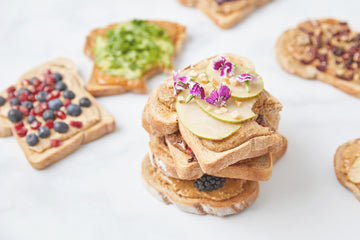
Our customers are curious, ingredient-conscious people. As such, we field a lot of questions about the nutritional benefits of different nut butters.
One of the most frequent questions we get is, “What are the nutritional differences between peanut butter and almond butter?”.
While we don’t employ a nutritionist or registered dietitian on our team, there is an abundance of verified information out there about the health-giving properties of nuts.
At Big Spoon Roasters, we love peanuts and almonds equally and use them alone or in combination with other nuts often. In fact, since the launch of our very first recipe, Peanut Pecan Butter with Wildflower Honey, we’ve developed a reputation for our innovative blending of multiple nuts and roast profiles in single nut butters.
In this article, we’ll start with the assumption – ok, declaration – that both peanut butter and almond butter are exceedingly delicious, especially when they are freshly roasted, milled, and mixed. Now that we’ve agreed about that, here’s an outline of the basic nutritional properties of both peanut butter and almond butter for you to compare!
Peanut Butter Nutrition
In general terms, peanut butter supplies a rich source of protein, vitamins, minerals, and other nutritional benefits. Peanuts, which are technically legumes, have more protein than any nut (7g per serving), have more than 30 essential vitamins and minerals, and are a good source of fiber and heart-healthy fats.
Vitamins & minerals provided by peanuts: (per 1 oz serving):
- Protein: 7g. As mentioned above, peanuts have more protein than any nut.
- Fiber: 9% Daily Value (DV). Fiber adds plant-based bulk to your food and helps you feel full longer while also aiding in digestion and removing toxins from the body. In fact, the Dietary Guidelines for Americans urge Americans to consume more fiber-rich plant foods for better health.
- Monounsaturated Fats: 12g - Help decrease harmful LDL cholesterol and increase protective HDL cholesterol.
- Vitamin E: 17% DV. Vitamin E is a dietary antioxidant that helps protect cells from oxidative stress, which is a normal, yet damaging, physiological process.
- Potassium: 216mg or 4.3% DV. Potassium helps regulate blood pressure and is important for heart health and muscle contraction.
- Magnesium: 12% DV. Magnesium is important for muscle function (including the heart), enzyme function, and energy production.
- Niacin: 24% DV. Niacin is an important B vitamin that helps to convert food to energy, aids with the digestive and nervous system, and helps support healthy skin.
- Phosphorus: 15% DV. Phosphorus is important for the formation of teeth and bones, cell growth, and muscle function. It also helps the body use vitamins to create energy for cells.
- Iron: 1mg or 6% DV. Iron carries oxygen to all body cells.
- Manganese: 0.5mg or 22% DV. Manganese is important for processing cholesterol, carbohydrates, and protein.
- Folate: 10% DV. Folate is needed for cell division. Adequate folate intake is especially important during pregnancy and childhood when tissues are growing rapidly.
-
Copper: 36% DV. Copper is essential for red blood cell formation and for supporting healthy blood vessels, nerves, immune system, and bones.
Peanuts also contain other nutrients, including:
- Arginine
- Phytosterols, such as beta-sitosterol
- Resveratrol
- Selenium
-
Zinc
Good Fats
According to the Food and Drug Administration, “Replacing saturated fat with similar amounts of unsaturated fats may reduce the risk of heart disease. To achieve this benefit, total daily calories should not increase.” One serving of dry-roasted peanuts or natural peanut butter (30 grams) has 12 grams of unsaturated fat, only two grams of saturated fat, and no trans fats.
In addition, scientific evidence suggests, but does not prove, that eating 1.5oz per day of most nuts, including peanuts, as part of a diet low in saturated fat and cholesterol may reduce the risk of heart disease.
BROWSE PEANUT BUTTERS:
Chai Spice Peanut & Almond Butter
Maple Cinnamon Peanut & Pecan Butter
LTD Batch Rancho Gordo El Rico Chocolate Peanut Butter
Peanut Butter with Wildflower Honey
Peanut Pecan Butter with Wildflower Honey
Wag Butter - Peanut Butter for Dogs
Almond Butter Nutrition
 Like most tree nuts, almonds are terrific sources of health-promoting nutrition.
Like most tree nuts, almonds are terrific sources of health-promoting nutrition.
- Almonds are an excellent sources of vitamin E, magnesium, manganese, copper, phosphorous, riboflavin, and dietary fiber.
- Per 1oz serving, almonds offer 13 grams of “good” unsaturated fats, just 1 gram of saturated fat, and zero cholesterol.
When compared ounce for ounce, almonds are the tree nut highest in protein, fiber, calcium, vitamin E, riboflavin, and niacin.
Vitamins & mineral provided by almond butter: (per 1oz serving)
- Protein: 6g – As the building block of the body, protein helps build and preserve muscle, bone, skin, and nails. It also helps keep you satisfied.
- Fiber: 4g or 14% DV. Fiber helps promote fullness, digestive health, and healthy blood sugar levels.
- Monounsaturated Fats: 9g – Monounsaturated fats help decrease harmful LDL cholesterol and increase protective HDL cholesterol.
- Vitamin E: 7.3mg or 50% DV. Vitamin E is an antioxidant that helps protect cells from damage and promotes healthy skin and hair.
- Potassium: 210mg or 4% DV. Potassium helps regulate blood pressure and is important for heart health and muscle contraction.
- Calcium: 76mg or 6% DV. Calcium helps build and support strong bones and teeth.
- Magnesium: 77mg or 20% DV. Magnesium helps regulate muscle and nerve function, blood sugar levels, and blood pressure.
- Riboflavin: 0.3mg or 25% DV. Riboflavin is a B vitamin that helps convert food into fuel. It is important for red blood cell production.
- Niacin: 1mg or 6% DV. Niacin is a B vitamin that supports energy production.
- Phosphorous: 136mg or 10% DV. Phosphorous helps build and maintain strong bones and teeth and plays a role in how the body uses and stores energy.
- Iron: 1mg or 6% DV. Iron carries oxygen to all body cells.
BROWSE ALMOND BUTTERS:
Almond Butter with Wildflower Honey
Carrot Cake Almond & Walnut Butter
Chai Spice Peanut & Almond Butter
Chocolate Sea Salt Almond Butter
Pistachio Crunch Almond Butter
Tigerwalk Espresso Almond Butter
Vanilla Caramel Almond & Cashew Butter
Is One Better than the Other?
 Not really, unless we are speaking about specific micronutrients. The good news is twofold – you really can’t go wrong and you don’t have to choose! Both peanuts and almonds are delicious and nutritious, which is why we work with them so much in our nut butters and bars. Even if you have a preference in terms of taste and texture, you can rest assured that both peanuts and almonds are excellent choices when it comes to nutrition. Here are a few direct comparisons to consider:
Not really, unless we are speaking about specific micronutrients. The good news is twofold – you really can’t go wrong and you don’t have to choose! Both peanuts and almonds are delicious and nutritious, which is why we work with them so much in our nut butters and bars. Even if you have a preference in terms of taste and texture, you can rest assured that both peanuts and almonds are excellent choices when it comes to nutrition. Here are a few direct comparisons to consider:
- Almonds and peanuts have many of the same vitamins, such as B and E, but in different amounts. If you need to focus on adding more Vitamin E, eat more almonds, because they offer 50% of your recommended daily allowance in a 1oz serving.
- Peanuts are better sources of B vitamins like folate and niacin. Just 1oz of peanuts offers 10% of your recommended daily allowance (RDA) of folate and about 24% of the RDA of niacin. Almonds have less of these healthy vitamins.
- The magnesium content in both options is great, but almonds have slightly more.
- Almonds have two times more iron and five times more calcium than peanuts, though they both have the same amount of zinc.
Read Labels Carefully

Even though the basic ingredients of peanuts and almonds are nutritious, most of the peanut and almond butters on retail shelves are made with ingredients that should only be eaten in moderation or not all. Look out for:
- Highly refined sugars/sweeteners. Added sugars or sweeteners in the form of evaporated cane juice, corn syrup solids, high fructose corn syrup, powdered sugar, and castor sugar.
- Artificial sweeteners such as acesulfame-K, aspartame, neotame, saccharin, sucralose, and xylitol (which is deadly to dogs).
- “Natural” low-calorie sweeteners such as stevia and monk fruit extract, which are usually blended with different sweeteners, such as erythritol (a sugar alcohol) and/or dextrose (glucose).
- Hydrogenated oils. Hydrogenated oils are a “convenience” ingredient used to prevent natural oil separation and stirring. These oils add unhealthy trans fats, which are unhealthy even in small amounts.
- Palm oil. Palm oil is sneaky because it can be Certified Organic and is often found in “all-natural products.” It is commonly used in nut butters to help prevent natural oil separation. Palm oil is high in saturated fat and is a huge contributor to deforestation in equatorial regions. Avoid this ingredient if possible. See our other blog post, Just Say No to Palm Oil.
- Products labeled as “reduced-fat." Usually when fat is removed from a food, sugar and starchy fillers are added to compensate for flavor. You may be getting less fat but more sugar and fillers.
- Peanut butter and jelly mixed together. When you purchase PB&J in one container, you get a lot of artificial ingredients and sugar that can be avoided if the two spreads are bought separately.
When you choose Big Spoon Roasters nut butters, you’re not only choosing small-batch nut butters that have been handcrafted from scratch, you’re also choosing nut butters FREE of refined sugars, artificial sweeteners, hydrogenated oils, palm oil, soy, dairy, gluten, or “natural flavors” (a phrase used to disguise chemical flavor enhancers).
We obviously love geeking out about ingredients, so if you ever have any questions about ingredients, nutrition, or anything else, please don’t hesitate to write us at info@bigspoonroasters.com.
Stay up-to-date on the latest Big Spoon Roasters news, sales, and products by subscribing to our email list. By signing up, you'll be entered to win a seasonal nut butter trio!


